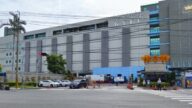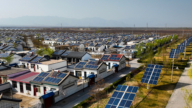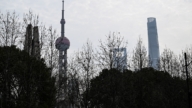【新唐人2013年07月12日訊】6月19號,在中共舉行的國務院常務會議上,總理李克強指稱,當前中國的經濟和金融面臨嚴峻的問題,而這些問題使他「透不過氣來」。他還明確指出了6方面問題。不過從李克強的問題中,分析人士解析,李克強等於自己承認了﹕中共本身是造成社會動亂和金融震盪的一顆定時炸彈。
香港《爭鳴》雜誌最新一期的內容,其中提到,李克強在近期的國務院常務會議上,著重講了當前中國社會經濟、金融面對的嚴峻問題,他還強調,有6方面的經濟問題,壓得他透不過氣來。
這六個問題分別是:
1.中央和地方就經濟發展及經濟轉型的政策、方向不協調、矛盾﹔
2.經濟發展和轉型處於徘徊狀況,影響整個國民經濟發展規則進程﹔
3.金融的管理、監管、金融資源配置,處於不完善、不規則狀況,金融不良資產長期高築﹔
4.證券市場長期處於不規則狀態,和受利益集團操控情況,成了社會動亂、金融震盪的計時炸彈﹔
5.地方國民經濟增長數據、稅收數據、借貸數據、資金外流數據、進出口外貿數據、大型工程進度數據等統計,都存在不同程度的、大的誤差﹔
6.社會各項有關民生通脹指標被有意造假,以掩飾社會矛盾和民怨民憤。
那麼,在中共集權的統治下,地方和中央的所謂「不協調、矛盾」是如何產生的﹖記者就此採訪了美國「南卡羅萊納大學」艾肯商學院教授謝田。
謝田舉例說,從中央的角度來講,他們希望中國的經濟轉向高附加值,和高科技環保這些產業上,而地方政府為了眼前利益,著重發展燒煤、燃煤企業,開採煤礦,因此破壞了環境。
美國「南卡羅萊納大學」艾肯商學院教授謝田:「這個問題說明,雖然是中央集權的,但有時在很多問題上,中央政府的管理和控制也是失靈的。中央和地方在經濟發展方向上的分歧,李克強如果因為這個透不過氣了,他應該問問習近平應該怎辦?」
對於李克強提的——當前經濟發展和轉型處於徘徊狀況,謝田認為,這是在告訴大家,中共所希望的經濟發展和轉型已經停止不前或者沒有突破。
謝田:「所有的政權包括那些獨裁政權,都希望把他的經濟搞的很好,就可以換取他的合法性,但是經濟的轉型也好、產業升級也好,根本不是獨裁統治集團心想就可以成的,這個要通過很多的基礎研究、應用研究、和一個自由開放的社會,才能促成。」
據了解,前中共中央政法委書記周永康和兒子周斌父子兩人,利用在石油和政法委系統的影響力,大搞權錢交易。《大紀元》新聞網報導,周永康家族已經集聚至少200億財富。
謝田:「中國金融的管理和控制是在誰的手裡呢﹖恰恰就在中共的特權階層,高幹子弟權貴階層的手中,被權貴階層所綁架。恰恰是中國共產黨造成的。要解決配置不完善、不規則狀況,也必須把中國共產黨的權力給解除掉。」
2011年,江澤民的孫子江志成(Alvin Jiang)建立了「博裕投資顧問有限公司」,這傢俬募基金將籌集至少10億美元,對中國市場進行收購。
而中共中央政治局常委劉雲山的兒子劉樂飛,是「中信產業基金」的董事長兼CEO。
謝田:「證券市場長期處於不規則狀態和受利益集團操控的情況,造成了社會動亂、金融震盪的計時炸彈,這個也確實值得讓李克強透不過氣來。但是,為甚麼有這種不規則狀態,就是因為共產黨他自己又高於法律的權力。實際上李克強這個說法承認了中共本身造成中共社會動亂和金融震盪的一個定時炸彈。」
稍早前有分析指出,李克強想通過「錢荒」,逼迫銀行把資金用於支持實體經濟,但是,面對中共權貴階層把持的金融業,他也無能為力。
採訪編輯/常春 後製/王明宇
Chinese Premier Li Keqiang Exposes Financial Pressures
On June 19, the Chinese Communist Party
(CCP) Premier Li Keqiang spoke in a meeting.
Li said the economic and financial problems
are now severe, and he can’t cope.
Li highlighted six issues.
Analysts said that Li has likely admitted
that the CCP is the leading cause of
social unrest and financial problems.
Chengming magazine’s latest issue in Hong Kong
reported that Li Keqiang spoke in a state council meeting.
The current Chinese economy is facing severe problems.
He said that six aspects had given him
a lot of pressure, which he can’t handle.
The six issues are:
Conflicts with policy and direction of economic development
and restructure exists between Central and local government.
Economic development and restructuring is lingering,
and inhibiting the entire national economy from progressing.
Financial management, regulation and resources
are imperfect, and bad assets have accumulated.
The stock market have long been controlled
by interests groups, causing social unrest.
There are large data errors with local economic growth,
taxations, loans, financial outflows, and imports/exports
livelihood inflation targets are intentionally
fraudulent, to cover up social discrepancies.
Under CCP totalitarian rule, how are conflicts
between local and central governments created?
NTD interviewed Xie Tian, Professor at the School
of Business, University of South Carolina Aiken.
Xie Tian gave an example.
From the central governments point of view, China’s
economy should be transformed into a high value-added
and high-tech, environmental protection industry.
However, local governments focus on the coal
mining industry, in order to obtain immediate profits.
Thus, there is environmental destruction.
Xie Tian: “This example indicates that although the CCP
is centralized, in many aspects, it does not have control.
There are conflicts between central and local government,
with regard to the direction of economic development.
If Li Keqiang feels he can’t handle this,
he ought to ask Xi Jinping what to do?”
Xie Tian commented on Li Keqiang’s words about
economic development and transition being insecure.
It shows economic development and restructuring
has stopped, or that has not made a breakthrough.
Xie Tian: “All countries, including dictatorial regimes
hope to do well economically, in order to gain legitimacy.
But, it doesn’t work like that.
They need to go through many basic studies and practice,
and need to have freedom in society to achieve this goal.”
Sources said that former head of the Politics and
Law Commission Zhou Yongkang, with his son
Zhou Bin, have used their influence in the oil industry.
They have vigorously bartered with money and power.
The Epoch Times website reported that the Zhou’s
has seized at least 20 billion Yuan in assets.
Xie Tian: “Who does really control China’s finances?
Precisely speaking, it is controlled by the CCP
privileged groups, and officials princelings.
The CCP is the leading cause of the problems.
To solve the problems of economic imperfection
and irregular situations, the CCP must be removed.”
In 2011, Alvin Jiang, grandson of Jiang Zemin,
established a private equity firm Boyu Capital.
He raised at least $1 billion
to buy companies in China.
Politburo member Liu Yunshan’s son, Liu Lefei is
Chairman and CEO of CITIC Private Equity Funds.
Xie Tian: “The stock market has had a long-term
irregular status, under control of interests groups.
It has caused social unrest and economic upheaval.
It indeed makes Li Keqiang feel he can’t handle
this well. However, what’s the reason to cause this?
The reason is the CCP is above the rule of law.
Actually, Li Keqiang’s words shows he admits the CCP is
the leading cause of social unrest and economic upheaval.”
Earlier, some analysts said that Li Keqiang wanted to use
“cash shortages” to force banks to fund the economy.
However, the CCP privileged groups control
the financial industry, and Li can’t do anything.





























